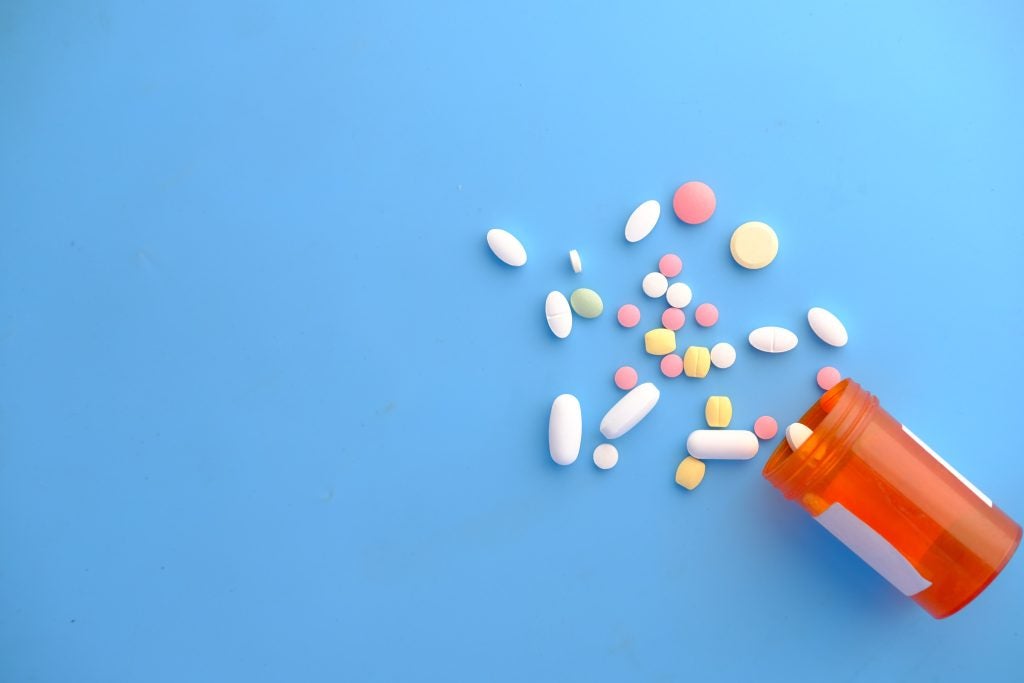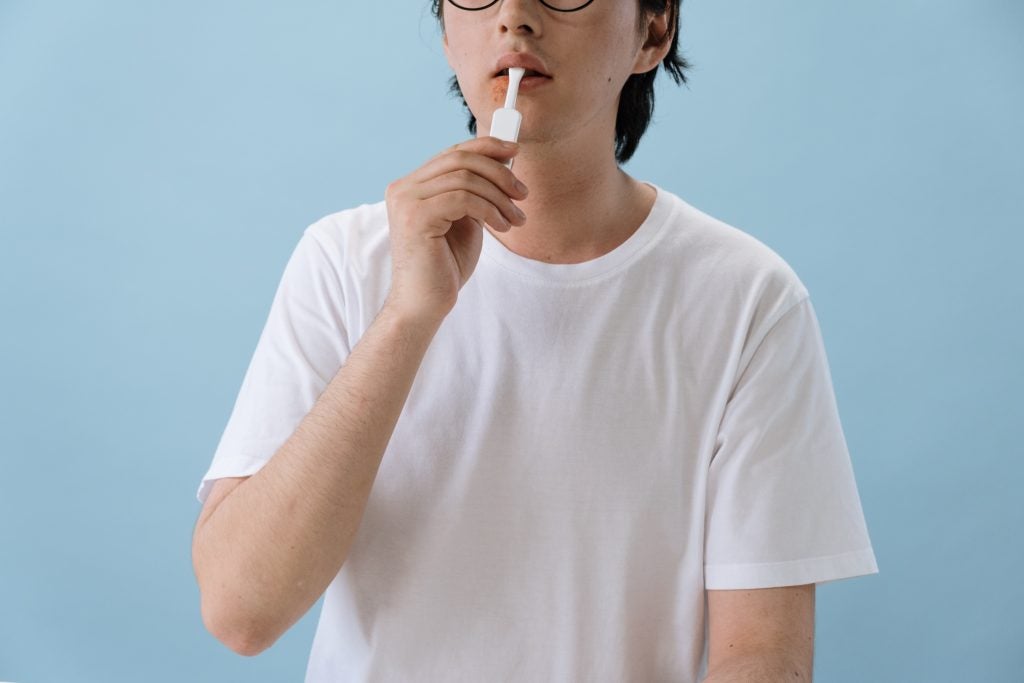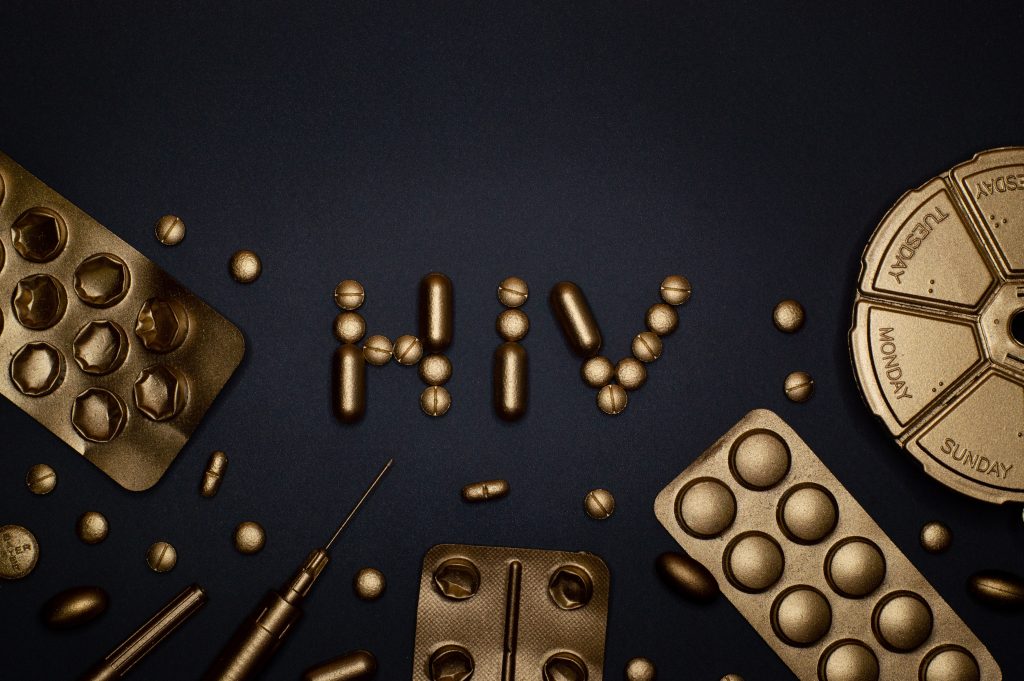
Transmission of the herpes simplex virus (HSV) often goes undetected. This is because HSV has an incubation period that can range from a few weeks to over a year. Most people infected with the virus discover their condition either from an initial outbreak or from the results of a blood test.1 The realization that a person is a carrier of the virus can be rather overwhelming as there is currently no cure for a Herpes infection.2 HSV can remain dormant yet fully present in the body even in between viral outbreaks. Therefore, it is strongly recommended that carriers of HSV who choose to engage in sexual activity take precautions. Utilizing condoms not only serves as a barrier method against the transmission of the herpes virus and other sexually transmitted infections (STIs) but also as an aid in preventing pregnancy.1
Equally, initiating drug treatment can help shorten the duration, mute the severity, and even prevent viral outbreaks from materializing in the first place. This treatment lessens the chances of spreading the virus to future sex partners.2
Table of Contents
Before Using Medication
The following antiviral medicines can all be prescribed to treat the symptoms of HSV such as herpes labialis (cold sores), herpes zoster (shingles), and genital herpes.3 This makes consulting with a healthcare professional paramount before deciding which treatment would work best for you.
Considerations should include allergies (if any) to similar drugs, pregnancy, breastfeeding, other concurrent medications being taken, and whether the medication is prescribed or over-the-counter (OTC). Alcohol, tobacco, and illicit-drug consumption levels should also be taken into account. Moreover, any further medical problems you have had or are experiencing, particularly if they correspond to the immune system (like the human immunodeficiency virus (HIV), should be disclosed as the efficacy of some of the following drugs is highly variable in patients with weakened immune systems.3
*Always keep any and all medicines out of the reach of children*
Acyclovir vs. Valacyclovir
Among the available drugs, Acyclovir (ACV), also known as Zovirax, is the original treatment and remains one of the best options for people suffering from HSV outbreaks. ACV can be taken orally, intravenously (inserted directly into the body through an IV), and topically. Oral ACV spreads widely throughout the body via bodily fluids. Intravenous ACV is reserved for patients with compromised immune systems such as those suffering from HIV. Topical ACV works in the area of application but has little effect elsewhere in the body. Acyclovir works to stop the replication of the herpes virus in DNA. It has been approved by the Food and Drug Administration to treat both HSV-1 and HSV-2 during initial outbreaks, to control recurrent outbreaks, and as a therapy to suppress the virus’ activity for extended periods of time. For best results, an Acyclovir regimen should begin at the first sign of herpes sores or lesions.1
While Acyclovir continues to provide relief to countless numbers of people experiencing HSV, a newer drug has developed to improve the overall treatment process. Valacyclovir was created to provide better levels of absorption within the body. Its mechanisms for action within the body are the same. Valacyclovir is intended for use in the treatment of both genital and oral herpes and to help curb infections by reducing the frequency and severity of outbreaks.1
Usage
Acyclovir and Valacyclovir can be used to treat herpes infections once symptoms are already present, but both can also be taken in daily regimens as part of suppressive therapy. The dosage of a daily regimen is typically smaller (i.e., one 500mg pill daily versus three 1g pills at the first sign of an outbreak), although the actual dosage is determined by a medical professional based on the average number of outbreaks experienced in a year. When taken in a low dosage twice daily, Valacyclovir has a 44% likelihood of preventing lesions before they fully develop; the chance of a lesion fully forming is closely related to the quickness with which treatment is started. The chance of the lesions fully aborting is almost twice as likely when treatment is begun within the first six hours of experiencing symptoms.1
Outbreaks suffered by persons infected with herpes are an unpleasant and often painful reminder of the virus’ presence within their body. Equally troublesome is the potentially challenging feat of finding sexual partners after revealing the status of this condition. This is where Valacyclovir provides an exciting and unexpected benefit: when taken in a daily suppressive regimen, Valacyclovir was found in an eight-month study to reduce herpes transmission by 50% among susceptible partners. Persons infected with HSV can spread the virus outside of a detected outbreak, creating the risk of transmission even when no symptoms are present; suppressive regimens of Valacyclovir work to decrease asymptomatic shedding.1
Penciclovir
Penciclovir, also known by its brand name Denavir in the U.S., is a topical cream fashioned to combat the symptoms of a herpes simplex infection around the mouth (cold sores). The applied dosage is subject to circumstance and, therefore, should be determined by a medical professional. Factors such as prescription strength to the number of times one should apply the cream vary from person to person, especially among children.3
Usage
General guidelines dictate that adults apply Penciclovir directly onto affected region(s) every two waking hours throughout the day for four days. An optimal start to this regimen would be immediately upon any indication of pain, redness, blistering, tingling, or burning around the lips and face. Note that in the event of a missed dose, it is important to reapply the cream as soon as possible and to carry on from then on with a consistent schedule. However, if your original two-hour time marker is close approaching, it’s best to wait until then to reapply as it is critical not to double dose.3
Famciclovir
Much of what has been said about the previously stated medications can be said about Famciclovir, or Famvir, its brand name. Some key distinctions are that Famciclovir can also be used to treat herpes zoster (shingles) in addition to treating herpes labialis (cold sores) and genital herpes. Furthermore, it can also treat herpes infections in those who are immunocompromised (such as those afflicted by HIV).4
Usage
To treat shingles, it is suggested to take one tablet every eight hours three times a day for a week. On the other hand, cold sores around the mouth only necessitate one preemptive dose at the first sign of symptoms such as tingling, pain, itchiness, burning, or rash at or around the lip region. Quelling genital herpes requires immediate dosing within the first six hours of initial symptoms, then it should be continually consumed twice daily until instructed otherwise.5
Side Effects

It is possible for side effects to arise as a result of starting a new drug regimen, but it is nevertheless critical to distinguish between the benign and immaterial symptoms from those that might be potentially hazardous.
The most common side effects for all these medications are headaches while lesser but still common side effects include rashes, redness of the skin, a decreased sensitivity in touch and feeling of the skin, and even a change in the sense of taste.3 Other possible symptoms may include nausea, vomiting, painful menstrual period, diarrhea, loose stools, gas, tiredness, and tingling in either the hands or feet.4
Though unnerving, none of the preceding side effects merit additional professional attention unless they persist. Seek immediate medical re-evaluation if experiencing pain, numbness, stinging, or burning as a consequence of using any herpes medication.3
Storage
Keep all medicines sealed and stored away from moist, hot, or freezing environments as well as away from direct sunlight and out of the reach of children. Combined, these factors make the bathroom one of the poorest places to store the medicine.4
Concluding Remarks

For people who are facing the likelihood of a lifelong herpes infection, these drugs are an important tool that can improve their quality of life. Acyclovir, Valacyclovir, Penciclovir, and Famciclovir work to decrease the severity, intensity, and duration of outbreaks and are available in a variety of dosing strategies (depending on the preference of the patient and doctor). It must be stressed again that, while these drugs do provide significant improvements in the lives of people infected with herpes, there remains no cure for this condition. Even so, being a carrier of the herpes virus will not prevent you from engaging in sexual activities altogether. So long as proper precautions are taken, coupled with full disclosure to all future sex partners, there is no reason one cannot achieve a fulfilled, caring, romantic, and responsible sexual life.
References
- Rajalakshmi, R., Rashmi Kumari, Devinder Mohan Thappa. “Acyclovir versus Valacyclovir, (439-44).” Indian Journal of Dermatology, Venereology & Leprology. vol. 76. no. 4. Wolters Kluwer, 21 Jul. 2010. Web. 15 Apr. 2018
- “Genital Herpes Treatment and Care.” Centers for Disease Control and Prevention. U.S. Department of Health and Human Services, 31 Oct. 2017. Web. 15 Apr. 2018.
- “Penciclovir (Topical Route).” Mayo Clinic. Mayo Foundation for Medical Education and Research, 1 Mar. 2017. Web. 15 Apr. 2018.
- “Famciclovir.” MedlinePlus. U.S. National Library of Medicine, 15 Dec. 2017. Web. 16 Apr. 2018.
- “Famciclovir.” AIDSinfo. U.S. Department of Health and Human Services, Sept. 2016. Web. 16 Apr. 2018.
Last Updated: 17 April 2018.
